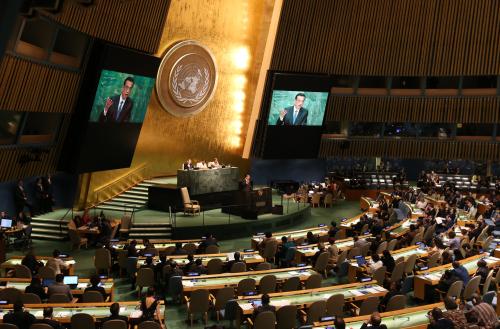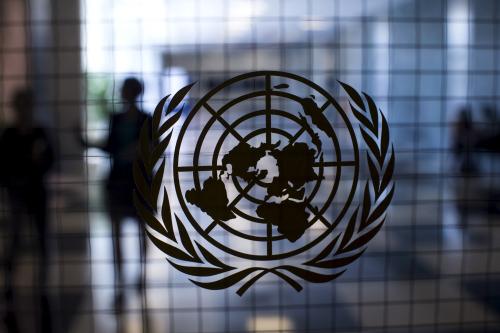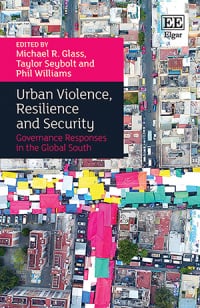Political influence over senior U.N. appointments will not disappear, but serious efforts to reinvigorate the U.N. system should include a rebalancing in the direction of the impartial, effective leadership envisioned in the United Nations Charter, writes Jeffrey Feltman. This article first appeared in the Cairo Review of Global Affairs.
Amidst the hand-wringing, multiple webinars, and reams of studies about the relevance of the United Nations 75 years after its founding in San Francisco, discussion of the deficiencies in the U.N.’s process to appoint senior leaders has been relegated to a sideshow in the macro debates over the future of multilateralism. As a former U.N. Under-Secretary-General for Political Affairs (2012-2018), I was a direct beneficiary of political influence over U.N. hiring. As such, I recognize and accept that what I intend here to be constructive criticism and suggestions to rebalance the appointment process will be interpreted by some as rank hypocrisy. On the other hand, I don’t speak out of self-interest.
Politics has always scented senior U.N. appointments. But as global polarization deepens, political bullying over U.N. hiring at the upper level risks becoming a stench, weakening the septuagenarian body’s independence and effectiveness. Of course, there is a root tension between the impartiality that U.N. officials swear to uphold and the influence that the U.N. Secretary-General (SG) may desire from his senior advisors on their respective national capitals. For example, appointing U.S. citizens to head UNICEF and the World Food Program is surely expected to facilitate continued U.S. financial support for their operations. Finding and keeping the balance between these two priorities is one thing we must address.
Political influence over senior U.N. appointments will not disappear, and a glance at the European Union’s painful efforts to assign EU member state officials into slots every five years or how the African Union (AU) commissioners are chosen reveals that the U.N. is hardly alone in facing political jockeying over senior positions. Currently, the Organization for Security and Cooperation in Europe is paralyzed by political bickering, with all key positions being filled ad interim. But serious efforts to reinvigorate the U.N. system should include a rebalancing in the direction of the impartial, effective leadership envisioned in the United Nations Charter, even if political realities mean that the results will fall short of the absolute standard defined seventy-five years ago at its signing in San Francisco.
Politics has always scented senior U.N. appointments. But as global polarization deepens, political bullying over U.N. hiring at the upper level risks becoming a stench.
A Spectrum of Compliance with the U.N.’s Oath of Office
Appointed by Ban Ki-Moon in his second term as SG, I also served under António Guterres during his first 15 months in office. Neither the Obama nor Trump administrations ever put me in a position that violated my oath of office as an international civil servant (even if U.N. colleagues suspected otherwise). Perhaps Ban hoped I would have possessed magic with Washington rather than merely serving as (what I have described) as a “translator” of Washington’s policies for him. The question remains whether I was less useful to Ban because I was so attentive to the impartiality required by my U.N. service.
For others serving at the Under-Secretary-General (USG) and Assistant-Secretary-General (ASG) levels in either U.N. headquarters or in the field, the picture is mixed: some USGs and ASGs, especially those (few and declining in number) “career” appointees who rise from within the U.N. ranks, take the oath to U.N. impartiality quite seriously. Others remain in varying levels of allegiance or sensitivity to their home governments, often because they expect to return to their government service after leaving the U.N.
Several examples illustrate how wide the spectrum can be for independence of one’s home government. One of my predecessors as Under-Secretary-General for Political Affairs, Kieran Prendergast, did not disguise his conviction that the U.S.-led invasion of Iraq was wrong on all levels, upsetting the Blair government in his native United Kingdom. By contrast, after concluding his tenure as Under-Secretary-General for the U.N.’s Department of Economic and Social Affairs (DESA), Chinese national Wu Hongbu told CCTV that he represented Chinese interests inside the U.N. Secretariat, citing his expulsion of the head of the World Uyghur Congress from the U.N. Permanent Forum on Indigenous Issues in 2017, a partisan maneuver Wu’s successor attempted again in subsequent years. The perception inside the U.N. is that Paris’ monitoring of the Department of Peacekeeping Operations (DPKO, now the Department of Peace Operations) comes closer to the Chinese oversight of DESA than to the British and, now, United States’ benign neglect of the Department of Political Affairs (now Political and Peacebuilding Affairs) when led by U.K. and U.S. nationals.
The problem goes beyond P5 allegiances simply overriding a good faith interpretation of the U.N. oath of office. One USG invariably found ways to route his U.N. travel via his home capital, arriving back to New York gushing with refreshed enthusiasm for his country’s autocratic leader. An ASG noisily and intentionally drew attention to herself fleeing a banquet in her home country when Ban Ki-moon, visiting there, advocated for LBGTQ rights, despite host government hostility. Despite these examples, there are impressive U.N. officials at all levels and from all parts of the world who continue to take their oaths of office seriously.
When Peace Operation Appointments are Politicized
The process for appointing U.N. special representatives and special envoys (positions mostly at the USG level) heading peacekeeping operations and special political missions is tailor-made for political interference. To appoint these officials, the SG submits a letter to the fifteen Security Council members announcing his intended nominee, and Council members have forty-eight hours in which to “break silence” — i.e. voice their objections. If no objections are raised, the appointment becomes effective.
In this case, the veto-holding five permanent members (P5) and the elected 10 members (E10) are equivalent: Any member can “break silence” and derail an appointment. In practice, the E10 rarely object, and the P5 are notified of nominations quietly in advance, to spare the SG, the P5 member, and the proposed candidate the more public rejection of “breaking the silence.” It should go without saying that having qualified leadership in U.N. peace operations, typically dealing with some of the world’s most dangerous conflict situations, requires both the Secretary-General in his search and the council members in their endorsement to put the credentials of the proposed candidate above political calculations.
Political bullying over Sudan and Libya
Attempts this year to fill the heads of U.N. political missions in Sudan and Libya demonstrate how far U.N. hiring has diverged from this goal and from the ideals set forth in the Charter. They also reveal the extent to which over-politicization of appointments has undermined the U.N.’s work in two critical theaters. In Sudan, despite pushback from other Security Council members (and outright opposition from Russia and China), the French persisted for months in an ultimately unsuccessful effort to persuade Guterres to appoint a French national to head the U.N.’s nascent political mission in Khartoum, delaying its establishment at a critical moment in Sudan’s delicate political transition. France even induced senior Sudanese officials to lobby Guterres on behalf of this particular individual (who happened to be married to a Sudanese national with ties to one political faction in Khartoum). This would be the U.N. equivalent, entirely inappropriate, of Khartoum defining to Washington who the U.S. ambassador to Sudan should be. Had the French heavy-handedness succeeded, one wonders how the French national would have transcended perceptions that, rather than impartially representing the U.N., he was carrying out French policies.
In the case of senior U.N. leadership in Libya, the United States was the bully, although in opposition to candidates rather than in advocacy of any U.S. citizens. Reminiscent of former U.S. ambassador to the U.N. Nikki Haley’s February 2017 move to short-circuit the appointment of the highly respected former Palestinian Prime Minister Salam Fayyad merely because of his nationality, Washington blocked two recent proposals by Antonio Guterres to head the United Nations Support Mission in Libya (UNSMIL).
The backstory reflects Guterres’ fervent courtship of the AU, with its 54 member states representing over a quarter of U.N. membership. AU officials, still smarting over being sidelined during the 2011 Libyan uprising, advocated replacing UNSMIL with a joint U.N.-AU mission. While the AU mantra “African solutions for African problems” applies in many cases, Libya’s conflict is also an Arab, European, and international problem. Moreover, the track record of joint missions, reporting to divergent bodies, is not promising (e.g., Darfur, Somalia, the U.N.-Arab League envoys to Syria). With no Security Council enthusiasm for a joint mission, Guterres promised AU leaders that, when Ghassan Salamé departed his post as UNSMIL head, he would compensate for the lack of a joint mission by appointing an African national as UNSMIL’s next head.
Citing health reasons, Salamé resigned in March 2020. His position as head of UNSMIL remains vacant, as the United States blocked one African candidate proposed by Guterres and refused to give the green light on a second African candidate. But not wanting to be seen as stiffing Africa or rejecting altogether Guterres’ second choice (an experienced woman who served as her country’s foreign minister), the United States seized the opportunity of UNSMIL’s September mandate renewal to persuade the Security Council to create a new Libya special envoy position, to be located outside of Libya, to whom the UNSMIL head (now called “coordinator”) would report. In theory this allows Guterres to put his African candidate in Tripoli but in a subordinate position to the new special envoy (never mind that this bifurcated mission contradicts the usual American emphasis on budget-cutting and simplification of U.N. peace operations). Guterres’ candidate would surely hesitate about reporting to a special envoy rather than directly to the SG and Security Council. As a further complication, the three African members of the Security Council (known as the “A3”) had threatened for weeks to “break silence” in objection to any proposed special envoy candidate who is not an African national.
China has recently joined the game of alternately blocking and pushing candidates. Even before joining Russia to block the French candidate for the U.N.’s Sudan mission, Beijing pressured Guterres to appoint, in January 2019, a Chinese national as Special Envoy for the Great Lakes region of Africa. By all accounts, Xia Huang is qualified for the position, and one can hardly blame China — now the U.N.’s second-largest contributor to both the regular and the peacekeeping mandatory assessments — for expecting that a Chinese national would, for the first time, head a U.N. peace operation, as French, American, and British nationals have done repeatedly for years.
Losing out on gender parity
Commendably, Guterres has effectively used the appointments of special representatives, special envoys, and their deputies to advance his goal of gender parity throughout the U.N. More than 50% of his appointments to these positions since assuming office in January 2017 have been women. Today, the two largest U.N. political missions — in Afghanistan and Iraq — are both led by women (whose political deputies are also women), as is the head of the U.N.’s largest peacekeeping operation, MONUSCO, in the Democratic Republic of the Congo. The political mission in Iraq and the peacekeeping operation in Cyprus both have women in all top leadership positions. This is welcome news: there were no women as either heads of mission or their deputies in 1996, when Boutros Boutros Ghali served as U.N. Secretary-General.
But the picture is less encouraging when one looks only at the heads of mission, not the deputies. Even with progress under Guterres, of the 39 total peace operations (that is, peacekeeping operations, special political missions, and special or personal envoys) currently fielded by the U.N., only 10 are headed by women (a few slots, including Libya and Sudan, are vacant). As Guterres looks to increase the number of women deployed at senior levels, there is a potentially deleterious impact of member states pushing favorite candidates for USG-level heads of peace operations: the candidates pushed by member states, and often accepted by the SG, are almost invariably men. Acceding to member state lobbying of male candidates to head peace operations at the USG level risks relegating qualified women to the secondary ASG-level slots.
Recommendations for a More Impartial U.N.
A few fixes, consistent with the Charter and the General Assembly resolutions, would start to clear away some of the political pollution over USG and ASG appointments. Given ongoing debates about the future of the multilateral system including the U.N., officials at the U.N. and within member states may wish to consider the following among proposed reforms:
- Requiring those appointed at the USG or ASG level to resign from national government service. Currently, a USG or ASG can serve the U.N. while on leave of absence from national service. The perception, if not always reality, is that one cannot be impartial on matters related to national polities if expected to return to national service after leaving the U.N.
- Mandating a “cooling off” period of one year after U.N. employment, in which certain national positions would be off limits. While perhaps difficult to enforce, this would (like the above recommendation) reduce the temptation or perception of pandering to national governments while still in U.N. service in hopes of future employment.
- Rotating the nationalities of persons in leadership positions, at least within the U.N. Secretariat and the peace operations, consistent with the General Assembly’s intentions and starting with P5 nationals. French nationals have served as Under-Secretaries-General for Peacekeeping since 1997. Chinese nationals have led the Department of Economic and Social Affairs (DESA) since 2007, and three U.S. citizens have served sequentially as Under-Secretary-General for Political Affairs in the same 13-year period. British nationals have served as U.N. Humanitarian Coordinator continually since 2007. Russian citizens have enjoyed a near monopoly on the leadership of the U.N.’s Geneva headquarters for two decades, and Moscow will now presumably expect Russian nationals to succeed each other in the new USG-level counterterrorism advisor slot. The perception of entrenched P5 fiefdoms is not good for U.N. credibility in an increasingly multipolar world.
- Appointing P5 nationals proposed by P5 capitals to ASG-level Secretariat slots rather than USG positions. ASG positions are more numerous (with five ASGs reporting to the two Under-Secretary-Generals for Political Affairs and Peacekeeping Operations) and would convey similar benefits to the U.N. (or P5 capitals) as USG-level positions, in terms of being able to interpret P5 policies for U.N. staff. This would allow geographic rotation at the USG level, to allow more influential roles from nationals of other states in both the Global North and Global South. Having Indians, Germans, South Africans, and others in USG positions would help keep these countries constructively engaged with, and invested in, the U.N. This would not preclude having qualified P5 nationals serve as USGs elsewhere, such as heading peace operations, but it would end the P5 monopoly on heading Secretariat departments.
- Reserving a portion of USG and ASG positions for those high-quality international civil servants who have built successful careers inside the United Nations. For decades, the U.N. has recruited senior leaders from both outside and inside the U.N., in theory drawing from the best of new blood and experienced hands. But in recent years the mix has become unbalanced toward outsiders pushed by member states. However qualified those who can be deemed “political appointees” may be, there is a cost to morale, productivity, and retention of career officials in the U.N., if they see no chance for promotion to leadership positions. A U.N. drive for “agility,” superficially unobjectionable, risks becoming an excuse for sidelining even the most qualified career professionals to clear the way for more member state nominees, especially if the 38th floor occupied by the SG and inner cabinet prioritize member state relations over U.N. principles and U.N. staff morale.
- Emphasizing via a General Assembly resolution or an SG policy decision that member states are not the ones to select who will represent the United Nations in their countries, just as host countries do not select who their bilateral partners will deploy as ambassadors. Guterres could have stopped the machinations over the Sudan envoy immediately, had he warned the Sudanese that their lobbying was inappropriate. Member states would retain, via the process of diplomatic agrément and visa issuance, the ability to reject SG nominees considered unacceptable, but they could not hand-pick the U.N. representative and usurp the prerogatives of the SG and the Security Council.
it is unrealistic to imagine that, even if these recommendations were adopted, politics regarding senior-level U.N. appointments will evaporate under a renaissance of global goodwill.
Achieving the Inside-Outside Balance
Given that the United Nations rests on the support of member states, it is unrealistic to imagine that, even if these recommendations were adopted, politics regarding senior-level U.N. appointments will evaporate under a renaissance of global goodwill. Secretaries-General, no longer viewed as having the same authority as Dag Hammarskjold (the second SG to hold the post, 1953-1961), will continue to seek support from member states, including by pandering to at least some appointment demands. Yet, the fact that both large and small states still compete for their nationals to be appointed to senior-level U.N. positions is perhaps a hopeful sign that these states continue to see the U.N. as relevant 75 years after its founding. It would be more worrying if P5 and others simply did not care who filled key slots.
Nor, for that matter, are all political appointees by definition “bad” and all U.N. career employees “good,” in terms of the quality of their work and their embodiment of the spirit of the U.N. Charter. Sometimes the opposite is true, with national capitals proposing highly qualified individuals. Nor are all “outsiders,” for that matter, candidates of their governments. To name one example, Guterres proposed Ghassan Salamé for Libya because of his experience and qualifications, not because of any (non-existent in any case) Lebanese lobbying.
In the best examples, appointees from the outside bring the networks and energy of major capitals to the United Nations, as well as different skills and experiences. Career officials offer essential institutional memory and an understanding of how to draw upon the complex — and often infuriating but inescapable — U.N. system to achieve results. Geographic diversity of U.N. staff at all levels would signal that the organization accurately reflects its membership and contains the contacts, knowledge and experience to deal with challenges wherever they arise in the globe.
As any study of U.N. operations or other bureaucratic institutions shows, individuals make the difference between a successful or failed operation. A healthy combination of qualified, effective, geographically diverse “insiders” and “outsiders” at the U.N.’s senior ranks should be the goal, but with renewed emphasis on the impartiality required for international service. After all, when it comes to the peace and security issues that are at the heart of the U.N.’s purpose, U.N. legitimacy rests on both impartiality and universality.
The Brookings Institution is committed to quality, independence, and impact.
We are supported by a diverse array of funders. In line with our values and policies, each Brookings publication represents the sole views of its author(s).










Commentary
Restoring (some) impartiality to UN senior appointments
October 29, 2020